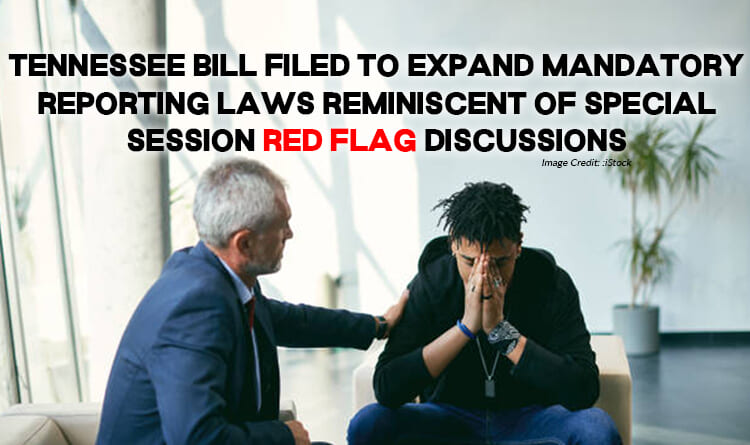Image Credit: iStock
The Tennessee Conservative [By Kelly M. Jackson] –
A bill has been filed by Representative Jason Zachary (R-Knoxville-District 14) that expands the current law requiring mental health professionals to report the possibility of potential violent acts by their patients.
According to the National Conference of State Legislatures, “Most states have laws that either require or permit mental health professionals to disclose information about patients who may become violent.”
Under ethical standards, doctors and mental health professionals usually must maintain the confidentiality of information disclosed to them by patients in the course of the doctor-patient relationship. With some exceptions codified in state and federal law, health professionals can be legally liable for breaching confidentiality.
Current laws in Tennessee read that a mental health professional has: “a duty to predict, warn or take precautions to provide protection… IF AND ONLY If:
(1) a service recipient has communicated to a qualified mental health professional or behavior analyst an actual threat of bodily harm against a clearly identified victim, AND
(2) the professional, using the reasonable skill, knowledge, and care ordinarily possessed and exercised by the professional’s specialty under similar circumstances, has determined or reasonably should have determined that the service recipient has the apparent ability to commit such an act and is likely to carry out the threat unless prevented from doing so,
THEN
(3) the professional shall take reasonable care to predict, warn of, or take precautions to protect the identified victim from the service recipient’s violent behavior.”
As demonstrated, there is no specificity with whom it is they are to report, there is no liability coverage for those who do, and there is the potential for lawsuits for damages due to violations of doctor-patient confidentiality.
The new bill, House Bill 1625 (HB1625) reads: Mental Illness – As introduced, requires a qualified mental health professional or behavior analyst to warn or protect an identified victim or group of people when the professional or analyst determines that a service recipient has communicated an intent for actual threat of bodily harm; requires the professional or behavior analyst to report such threat; provides immunity from civil, criminal, and regulatory liability for a professional or analyst who takes reasonable action to warn or protect identified victims or groups and to report such threat . – Amends TCA Section 33-3-206.
Based on a review of the current law and the new bill, the biggest differences have to do with the additions of potential victims, defined with less specificity than the current law, the agencies they are to report it to, as well as coverage for liability for those who choose to report their patients and disclose their private information under less specific circumstances.
While the original language narrowed the potential victim to a specific person, the new bill includes groups of people – “students at a day care or school, people at a place of worship, and members of the service recipient’s family.”
Noticeably omitted from the language of the new bill is the phrase existing in current law that requires the mental health provider not just to determine whether or not the patient has the ability, but also “whether or not they are likely to carry out the threat”.
Additionally, Zachary’s new bill includes additions greatly expanding section 3 which proceeds with :
“AND(B) report the threat to(i) the local law enforcement agency with jurisdiction over the municipality or county of residence of the service recipient, OR (ii) IF the threat is general and not imminent or clearly identified, 988 or local crisis response service. (b) A qualified mental health professional or behavior analyst who acts or makes a reasonable attempt to act in accordance with subsection (a) is not liable for damages in a civil action, subject to prosecution in a criminal proceeding, or subject to disciplinary action by a regulatory board for such act or reasonable attempt to act.”

This expansion raises many questions regarding privacy laws, what happens to the information once it is shared, where it will be stored, who will manage it, how it can be used, and who will have access to in perpetuity.
All the information being shared is done without any apparent due process.
If the professionals who share the information are wrong about their estimations, and the dissemination of private mental health information leads to serious damages for those who will be falsely accused, who will be responsible for the consequences if those who have been honor bound by their ethics as caregivers are no longer subject to the usual levers of accountability?
Are Tennesseans willing to potentially sacrifice their constitutional rights all in the name of “safety”? It seems we will find out in this coming general session.
As this bill makes its way through the legislative process, we will continue to cover its progress and report accordingly.

About the Author: Kelly Jackson is a recent escapee from corporate America, and a California refugee to Tennessee. Christ follower, Wife and Mom of three amazing teenagers. She has a BA in Comm from Point Loma Nazarene University, and has a background in law enforcement and human resources. Since the summer of 2020, she has spent any and all free time in the trenches with local grassroots orgs, including Mom’s for Liberty Williamson County and Tennessee Stands as a core member. Outspoken advocate for parents rights, medical freedom, and individual liberty. Kelly can be reached at kelly@tennesseeconservativenews.com.



